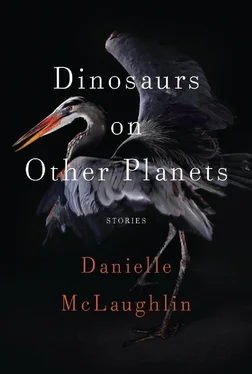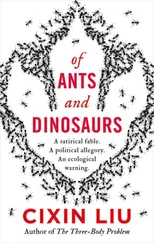“I was,” Lily said. “I am. In Ovindoli.”
“Isn’t that very far away?”
“Yes,” Lily said, “I suppose it is.”
“What are you doing here?” Etta said.
“I rang,” Lily said. “I tried to ring. I left a message.”
“You rang the hotel?”
“No, I rang you. I left a message. Two messages.”
Etta frowned again. “But how did you get my number?” She picked up a phone from beside her on the table and shook her head. “No messages,” she said.
The table was in the shade of an awning, but Lily was standing in the full glare of the sun. Out of vanity, she hadn’t worn a hat. She’d wanted to show off her hair — nutmeg — and now she could feel the top of her head beginning to burn. In an attempt to move things forward, she said: “I enjoyed the book very much.”
“I thought you’d like it,” Etta said. “I found it a little old-fashioned, but my mother loved it. I thought you might like it, too.”
“I see,” Lily said. The book had been bloody awful actually; she hadn’t been able to make head nor tail of it. She took it from her bag now and opened it to the title page. “Anyway,” she said, “that’s where I got your number. And I did leave a message but—”
Etta was laughing. “Oh, that’s my mother’s number,” she said. “She does that with all her books. Don’t ask me why.” She paused. “But what are you doing here?”
How to explain it, even to herself? Hope, she might have said, if she’d tried; the eternal triumph of hope over experience. That and the fact that, if she was honest, there was something about this young woman that reminded her of Sandra; she’d noticed it the minute Etta had settled into the seat opposite her on the train. Not a recent Sandra, an earlier version. She looked around to see if some plausible destination might present itself and saw an insurance office, a dry cleaners, a bank. “I came to see you,” she said.
Even at this late stage, there was the possibility that something might have been saved. There could have been a visit to the stone arch where together they might have deciphered the inscription above the entrance; a coffee, perhaps, in the hotel bar. Life, after all, was mostly the art of salvage. But Etta, her expression shifting in sudden recognition, was too young yet, too undamaged, to have learned this. “Oh,” she said. “I understand.” And then, “I’m seeing somebody.”
“Yes,” Lily said. “Of course.”
Then Etta set her mouth in a tight line and bent her head to her notebook. A strand of blond hair swung forward over the page like a guillotine. Today she was wearing a halter-neck top and there, again, were the beautiful clavicles: so snappable and exposed that Lily wanted to reach out and tug at the fabric in an effort to cover them, to tell this young woman who knew nothing that anything that can be seen can be broken. She stood a moment by the table, and when Etta said no more, she turned and walked to the end of the street where she could see the taxi driver buying cigarettes at a kiosk. Less than five minutes had passed since he’d dropped her off.
—
A REWINDING THEN, THE morning unspooled, back through the crumbling arch, past the steam-blowing factories, the car dealerships, the fields of solar panels. Dust rose from scorched verges to fall in a fine mist upon the taxi windscreen. The road shimmered in the heat. In a field off the highway were the ruins of a third-century Roman settlement — she recalled her guidebook enthusing about the advanced and intricate nature of the drainage system. Plumbing, she thought, as they passed a field remarkable only for its scattered lumps of stone, a particularly historic piece of plumbing. “Stop here,” she said to the driver, on spotting a signpost for a hiking trail. They were within sight of the Rifugio now, and she had no wish to field Allesandro’s questions as to why she was back so early.
It was approaching noon and, as she walked, the heat was intense on her arms, her legs, the tops of her shoulders. Burrs and sap stuck to her skin, gathering seeds and petals. Inside the woods, the canopy of trees brought some relief. Here, the ground was dry as flint, crisp with pine needles that exuded a dry heat. It was like walking on a bed of matches, and she wouldn’t have been surprised had they combusted beneath her feet. She arrived at a clearing where dozens of trees had been razed and the forest floor sloped to a cave mouth. A timber beam supported the entrance and into the timber two people called AL and RP had carved their initials, or perhaps one of them had carved their initials while the other looked on, indifferent. This place, too, she recognized from her guidebook. It was the cave where villagers had hidden during the war and which had now become a shrine; she recalled an arty photo of candle stubs, little coagulations of gray wax at the bottom of glass jars.
She squatted down and peered inside. The cave was not entirely dark; narrow tunnels burrowed upward, creating runnels of light. Squares of fabric cut from the clothes of the sick, the dying, the already dead were fixed to the walls. She should go in, she supposed; she should try to make the best of this place that Sandra had landed her in, but instead she settled herself on the ground beneath a tree. She shook pine needles from her sandals, brushed the traces of the meadow from her clothes. She leaned her head against the trunk and closed her eyes. The humiliation of earlier had faded a little. It would return, of course, as humiliations always did; it would wait for her in the long grass of memory. But for now there was a restfulness to the light that filtered through the trees, a tang, like incense, to the scent of pine needles.
She dozed a little. When she woke she found that the sun had somehow pierced the barricade of leaves, and a patch of skin on one arm was pinkening. She opened her bag to get sunscreen and there it was: Etta’s book, or, rather, Etta’s mother’s book. Why on earth hadn’t she left it behind in Gariano? She turned it over in her hands, gingerly, as if it might scald her, and knew immediately that she would never again buy a book in that particular shade of blue, or any book translated from the French, for that matter. There would be no more Sacher torte or nutmeg, either. So many things irrevocably spoiled.
She got up and walked around to the other side of the tree, positioned the book upright against the trunk. But that was littering, wasn’t it? She picked it up again. She could leave it in the cave, she supposed, next to all those grotty jars. She could pretend it was an offering of some sort, except some do-gooder might find it and attempt to repatriate it. She pictured pudgy do-gooder fingers punching out the phone number for Etta’s mother. Walking a little distance from the cave, she scuffed at the ground with her sandals until she had a patch cleared of pine needles. A pointy stick looked like it might be of use. She poked the ground with it, but without much effect, and so she poked harder until it broke. She tried a stone then, which worked better. Dropping to her knees, she began to dig. When she encountered a root, she threw aside the stone and tugged, broke the root, flung it from her with a small yelp of triumph.
She continued digging with her hands until it occurred to her what she must look like: an animal crouched in the dirt, clawing. She stood up quickly and glanced about, as if someone might be watching her, laughing at her— a whole new level of foolishness! — but there were only trees, tall and inscrutable. Now that she’d stopped digging, there was utter silence apart from the back-and-forth of a bird on a branch above her head, the barely perceptible, flinted movements of its feet like the striking of tiny matches. She became aware of sweat running down her face. She placed the book in the hole — though it was not so much a hole as a small indentation — and heaped pine needles on top. It was a rather pathetic effort, she thought, when she stood back to observe it. No doubt come nightfall, a fox or other wild creature would come sniffing around; it would pick up her scent and, frenzied with hope, would dig in expectation of something bloody. She pictured the book dismembered, pages from spine, and scattered over the forest floor, its blue cover scored with the imprints of many small teeth.
Читать дальше












